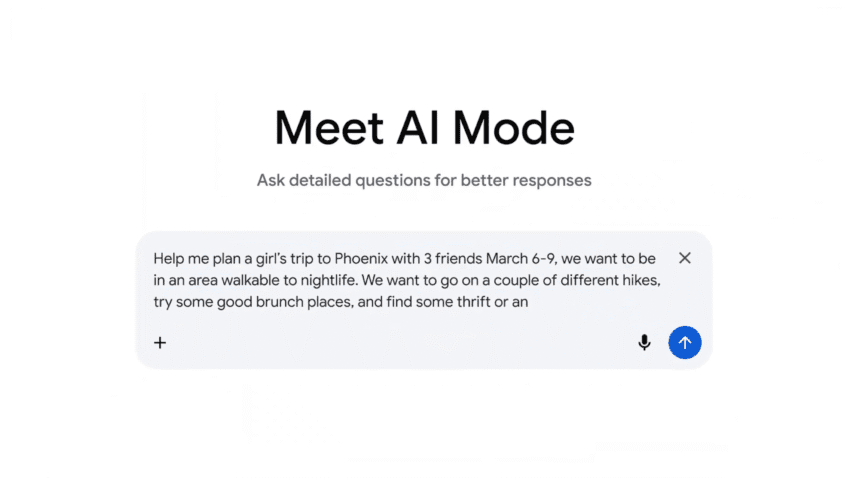
google s ai mode can now help Google has introduced a new feature in its AI Mode that allows users to visualize and plan their travel itineraries seamlessly.
google s ai mode can now help
Overview of Google’s AI Mode for Travel Planning
Google’s AI Mode is evolving to enhance user experience in travel planning. Users can now describe their upcoming trips directly to the AI, selecting the “Create with Canvas” option. This feature generates a detailed itinerary in a side panel, incorporating essential information such as flight details, hotel options, and more. The AI draws from a wealth of data, including photos and reviews sourced from Google Maps, to provide a comprehensive travel plan tailored to individual preferences.
How the Feature Works
Once users engage with the AI Mode, they can input their travel details, such as destination, travel dates, and personal preferences. The AI then compiles this information into a structured itinerary. This document not only outlines potential travel plans but also offers suggestions based on the user’s inputs. Users can further refine their plans by asking follow-up questions or making additional requests. For instance, they can request hotel recommendations based on specific criteria like pricing, amenities, or proximity to certain attractions. This interactive process allows for a more personalized travel planning experience.
Access and Availability
Currently, this feature is available to users in the United States who have opted into AI Mode within Google Labs. The drafted plans are conveniently stored in the AI Mode’s history, allowing users to revisit and modify their itineraries as needed. This accessibility marks a significant step in making travel planning more intuitive and user-friendly.
Background on Canvas and AI Mode
The Canvas feature was first launched in March as a dynamic workspace for Google’s Gemini AI. Initially, it was designed to display real-time coding output and other information, such as continuously updating study plans. Over time, it has evolved to become an integral part of AI Mode in Google Search. This evolution reflects Google’s commitment to integrating AI capabilities into everyday tasks, making complex processes like travel planning more manageable for users.
Impact on Travel Companies
Google’s foray into travel planning through AI Mode poses significant implications for other travel companies. Established platforms like Kayak and Expedia, which are also developing their own AI-powered features, may find themselves at a competitive disadvantage. As Google continues to expand its offerings, the potential for users to rely on its integrated services for travel planning increases. This shift could lead to a decrease in traffic and bookings for traditional travel agencies and booking platforms, as users may prefer the convenience of an all-in-one solution provided by Google.
Expanding Agentic Booking Features
In addition to travel planning, Google is broadening the scope of activities that can be booked through AI Mode. Users in the U.S. can already utilize AI Mode’s capabilities for automated booking of event tickets and local appointments. Recently, Google announced that agentic booking of restaurants would be rolled out to all U.S. users, not just those in Labs. This feature presents users with a curated list of dining options, complete with links to finalize bookings through Google’s partners, including OpenTable, Resy, Tock, Ticketmaster, StubHub, and SeatGeek.
Partnerships with Major Booking Platforms
To enhance its booking capabilities, Google is actively partnering with notable hotel companies and online booking platforms. Collaborations with industry giants such as Booking.com, Expedia, Marriott International, and Wyndham Hotels & Resorts are in place to facilitate agentic booking for flights and hotels. This strategic move not only enriches the user experience but also positions Google as a formidable player in the travel industry.
AI-Powered Flight Deals and Global Rollout
Google has also announced an expansion of its AI-powered Flight Deals search feature within Google Flights. Currently available to users in the U.S., Canada, and India, this feature is set to roll out globally to over 200 countries and territories, supporting more than 60 languages. This global expansion underscores Google’s ambition to make travel planning accessible to a broader audience.
Implications for Travelers
The introduction of AI Mode for travel planning and booking has several implications for travelers. First, it simplifies the often overwhelming process of organizing a trip. By consolidating various aspects of travel planning into one platform, users can save time and reduce the stress typically associated with planning. Additionally, the personalized recommendations based on user input can lead to more satisfying travel experiences, as travelers can discover options that align closely with their preferences.
Potential Challenges
Despite the advantages, there are potential challenges associated with this new feature. Privacy concerns may arise as users share personal preferences and travel details with Google’s AI. Ensuring data security and user privacy will be paramount as Google navigates this new territory. Furthermore, the reliance on AI for travel planning may lead to a homogenization of travel experiences, as users may gravitate towards similar recommendations generated by the AI.
Stakeholder Reactions
Reactions from stakeholders in the travel industry have been mixed. Some view Google’s advancements as a threat to traditional travel agencies and booking platforms, while others see it as an opportunity to innovate and adapt. Travel companies may need to rethink their strategies to remain competitive in an increasingly AI-driven landscape. The rise of AI in travel planning could also spur collaborations between tech companies and travel agencies, leading to new business models that leverage AI capabilities.
Future Outlook
Looking ahead, the integration of AI in travel planning is likely to continue evolving. As Google refines its AI Mode and expands its partnerships, users can expect even more sophisticated features that enhance their travel planning experience. The potential for real-time updates, personalized recommendations, and seamless booking processes could redefine how travelers approach trip planning.
In conclusion, Google’s AI Mode represents a significant advancement in the realm of travel planning. By leveraging AI technology, Google is not only simplifying the planning process for users but also positioning itself as a key player in the travel industry. As this feature continues to develop, it will be interesting to observe how it impacts both travelers and traditional travel companies alike.
Source: Original report
Was this helpful?
Last Modified: November 17, 2025 at 10:37 pm
3 views















